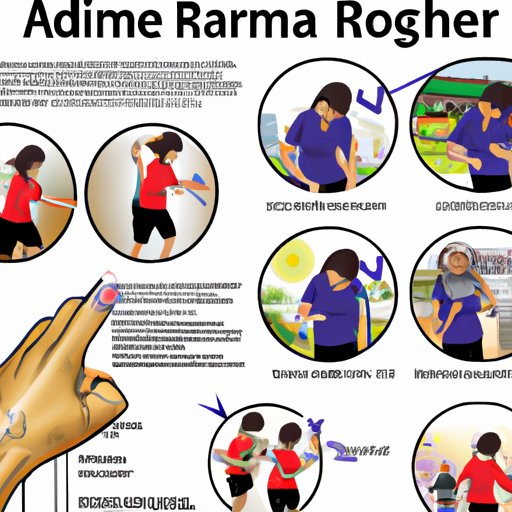Introduction
Rheumatoid arthritis (RA) is an autoimmune disorder that causes inflammation of the joints and other tissues in the body. People living with RA often experience pain, swelling, and stiffness of the joints, and may have difficulty performing everyday tasks. Exercise is an important part of managing RA symptoms, but it can also trigger an RA flare-up, which is a temporary worsening of symptoms. In this article, we’ll explore the relationship between exercise and RA flare-ups, and discuss strategies to minimize flare-ups when exercising.
Examining the Relationship between Exercise and Rheumatoid Arthritis Flare-Ups
RA flare-ups can be triggered by a variety of factors, including stress, lack of rest, and changes in temperature or humidity. Exercise is another potential trigger of RA flare-ups, and how it affects people with RA varies from person to person. For some, regular exercise can help reduce inflammation, improve joint mobility, and increase overall physical fitness. On the other hand, strenuous exercise can lead to fatigue and soreness, which can worsen RA symptoms and trigger an RA flare-up.

Exploring the Benefits and Dangers of Exercise for People with Rheumatoid Arthritis
Exercise is beneficial for people with RA, as it can help to reduce pain and stiffness, improve range of motion, and boost overall energy levels. Research has also shown that regular exercise can help reduce inflammation, improve cardiovascular health, and even slow the progression of the disease. However, it’s important to remember that too much exercise can be detrimental for people with RA, as it can lead to fatigue, soreness, and joint damage.
How to Exercise Safely While Managing Rheumatoid Arthritis Symptoms
When exercising with RA, it’s important to listen to your body and pay attention to any signs of fatigue or discomfort. It’s also important to avoid activities that put too much strain on the joints, such as running or high-impact sports. Low-impact activities such as swimming, yoga, or tai chi are often better options for people with RA. Working with a physical therapist can also be helpful, as they can recommend exercises that are specifically tailored to your individual needs.

Understanding How Exercise May Trigger a Rheumatoid Arthritis Flare Up
It’s not always possible to predict when an RA flare-up will occur. However, there are certain factors that can increase the risk of a flare-up occurring. These include excessive exercise, sudden changes in activity level, and exposure to cold temperatures. It’s also important to note that RA symptoms can worsen before a flare-up occurs, so it’s important to pay attention to any early warning signs.
Strategies to Minimize Rheumatoid Arthritis Flare-Ups When Exercising
When exercising with RA, it’s important to take steps to minimize the risk of a flare-up. This includes preparing for exercise by warming up and stretching beforehand, monitoring your symptoms during exercise, and modifying the intensity of your workouts if necessary. Additionally, it’s important to make sure you get enough rest and stay hydrated, as these can help to reduce fatigue and soreness.
Conclusion
Exercise is an important part of managing RA symptoms, but it can also trigger an RA flare-up. It’s important to understand the relationship between exercise and RA flare-ups, and to take steps to minimize the risk of a flare-up occurring. This includes listening to your body, avoiding activities that put too much strain on the joints, and making sure you get enough rest and stay hydrated. With the right approach, you can enjoy the benefits of exercise while minimizing the risk of a flare-up.
If you have questions or concerns about how to safely exercise with RA, talk to your doctor or a physical therapist. They can offer advice and support to help you find an exercise routine that works for you.
(Note: Is this article not meeting your expectations? Do you have knowledge or insights to share? Unlock new opportunities and expand your reach by joining our authors team. Click Registration to join us and share your expertise with our readers.)
